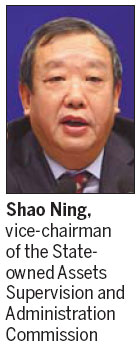-
News >Bizchina
Central SOEs increase payback to the State
2011-02-23 09:16
A China Mobile advertisement in Beijing. Companies controlled by the central government, including China Mobile, are expected to pay more dividends to the State. [Photo / China Daily]
BEIJING - Central State-owned enterprises (SOEs) will hand over 15 percent of their total profits to the State this year - 5 percent more than last year - in a bid to share the benefits provided by the rapid growth of the SOEs with the public.
"For those central SOEs with strong competitiveness, the profits turned over to the public finance should be at the same level as that of domestically listed companies, although the proportion will increase to 15 percent this year," said Shao Ning, vice-chairman of the State-owned Assets Supervision and Administration Commission (SASAC), the supervisory body for central SOEs.

Shao said an increase in the capital is inevitable and the State-owned assets will play a greater role as the economy grows steadily.
"In accordance with international standards, 30 to 40 percent of the total profits of listed companies should be distributed to their shareholders as a bonus," news portal Sina.com cited Jia Kang, head of the Research Institute for Fiscal Science of the Ministry of Finance, as saying.
According to the Ministry of Finance, the SOEs gave 44 billion yuan ($6.7 billion) to the State last year, accounting for 5 percent of their total profits.
SASAC has required central SOEs to hand over 5 to 10 percent of their total profits to the State during the last three years.
In 2010, the total profit generated by the central SOEs backed by SASAC reached 848.9 billion yuan, a year-on-year increase of 40.2 percent.
According to the SASAC, the amount of money handed to the public purse by State-owned companies was around 60 billion yuan, doubling the 31.5 billion yuan of last year.
Shao of the SASAC said the obvious increase in management gains stems from central SOEs' rising contribution to the public finances.
By the end of 2009, 156 billion yuan of State-owned equity was transferred to the Social Security Fund, accounting for 41 percent of the fiscal revenue of the fund.
Over the past few years central SOEs in the petroleum, electric power, food and transportation industries have been involved in projects such as the Qinghai-Tibet Railway, the Three Gorges Dam and electricity transmission from West to East China.
"In addition to giving part of their profits to the State, making great progress in their own industries to benefit all the people is another way to share their achievements," Ding Ningning, a research fellow with the Development Research Center of the State Council, told China Daily.
"Central SOEs in fast-growing industries such as high-speed railways, don't need to turn over profits to the State as much as other companies, as the capital input is a major priority at present for the industry which will bring more benefits to the public," said Ding, adding that for companies in different industries, there should be different for the amount turned over to the state.Liang Xiaomin, a researcher on SOEs at Beijing Technology and Business University, said increasing the proportion of profits turned over to the State can be also an incentive for central SOEs to ensure long-term development, because they need to earn more money to maintain operations and make business commitments.
